Looking for an alternative to Basecamp: PBworks Project Edition Review
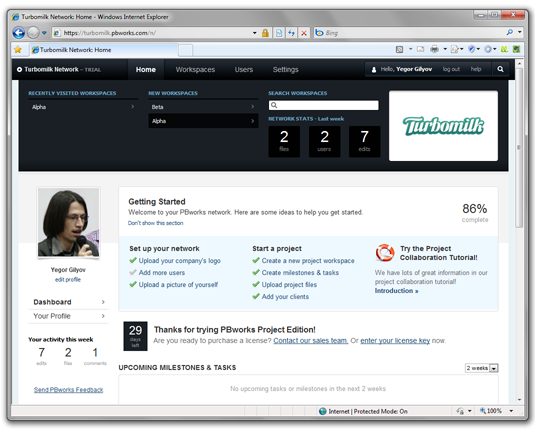
Basecamp should not be called a tool for project management. Even its creators understand this. Basecamp is the leading web-based project collaboration tool - written in large letters on the official website of this well-deserved product. Basecamp is a communication tool. Instead of email. Basecamp will not measure the workload for the next week on the team as a whole and for each employee in particular, and will not appreciate the reality of the deadlines set. Instead, he simply helps us share the right information within the team and with our clients. Therefore, it is ridiculous to compare Basecamp, for example, with Microsoft Project , or, if we talk about online solutions, with the Copper Project . These wonderful products solve completely different problems.
Why these lengthy arguments? In addition, the search for alternatives to Basecamp should not be in the Project Management Tools section, but in the Collaboration Tools section.
There, the fascinating world of wiki engines opens up to us, which are adapted to the needs of small businesses to varying degrees. Usually they are very scary in appearance and at first glance it is difficult to figure out how it all works and which button to press first. The introduction of such a wiki is the work of enthusiasts who firmly believe in the power of a wiki environment and who are able to infect others with this faith. But, fortunately, there are also engines with a human face that can be understood by ordinary people like you and me: Jive SBS , Socialtext , Confluence , PBworks . That's the latest product and will be discussed in today's article. Or rather, about the PBworks Project Edition. As you might guess from the name, this solution just marks Basecamp's niche: the organization of joint work on projects.
')
What is called a project in Basecamp is called a workspace in PBworks. And each space lives on its own subdomain. So if we, Turbomilk, do the work for XYZ, all communication will take place at turbomilk-XYZ.pbworks.com.
Here is the title page of the new project (that is, the workspace):
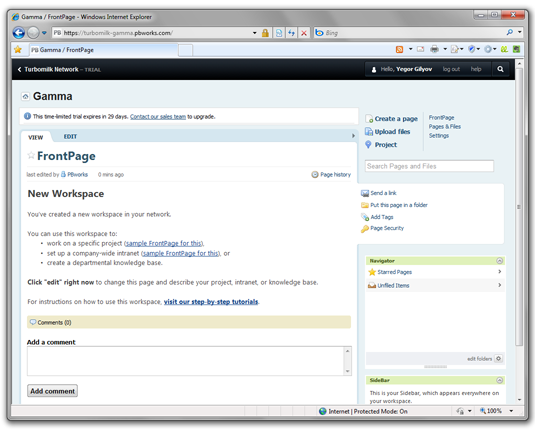
The main difference from Basecamp: the project does not look like a blog. That is, the pages do not fit into a linear sequence, but simply live by themselves and, if necessary, refer to each other. At first, such freedom is slightly discouraging. Obviously, additional efforts will have to be made so that all the necessary information remains at hand: arrange links, put pages into folders, assign tags to them.
In fairness it should be noted that in Basecamp the right information is also not always easy to find, especially if the project lasts a long time. The same tags would be very useful. In PBworks, any page can be marked with one or more tags. For example, we can start a “sketch” tag, and by typing “tag: sketch” in the search, get all the pages with sketches. All tags and pages marked with them can be seen at “yourworkspace” .pbworks.com / tags.php. However, it is very strange that you have to manually type this address in the browser (there is no such link anywhere in the navigation). Apparently, the origin of the product from the engines for wiki enthusiasts, ready for anything. But even such work with tags is better than none at all. In addition, this link forgotten by developers can be easily added to the SideBar panel:
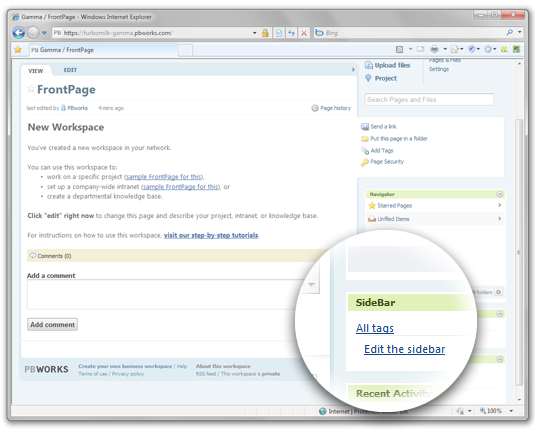
You can add anything to this panel, and it will be visible on all pages within the workspace. Very comfortably!
Another handy feature that helps keep the information you need at hand: asterisks. Any page can be marked with an asterisk, and these marks, unlike tags, are individual for each user. That is, no one sees the asterisks of other users. Pages marked with asterisks are easy to see in the navigator on the right:

Another important difference from Basecamp is the setting of notifications. In Basecamp, when creating a message, we choose which project participants should receive email notifications. In PBworks, the opposite is true: each user chooses when he would like to receive notifications. By default, the user receives notifications about changes to any pages every hour (if any). If you wish, you can, for example, order notifications only about changes to pages marked with asterisks, and no more than once a day:
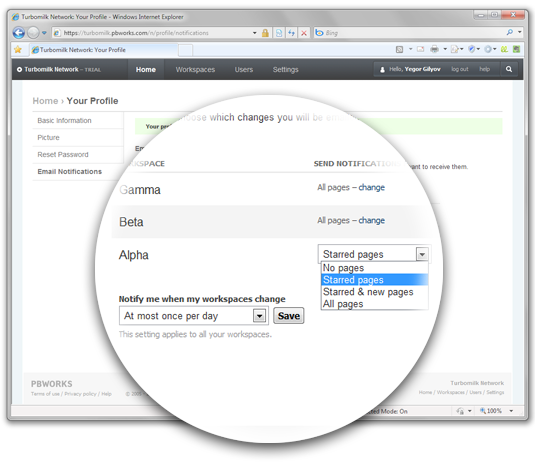
But is it worth guest users, that is, representatives of the customer, to receive an hourly summary of each of our sneeze? Of course not. Setting permissions for each individual page will help protect the customer from unnecessary details:
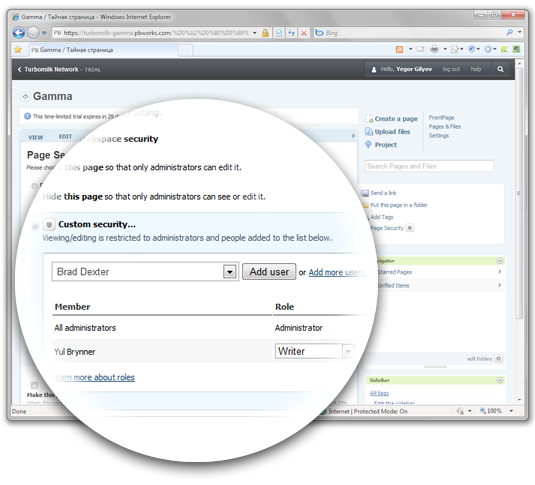
Pages in PBworks are edited using a visual editor with rather rich text formatting capabilities. However, this is quite typical for modern wiki engines. In modern times, it is difficult to get users to learn a special wiki language, and that’s not what it’s about.

And, of course, like any wiki engine, PBworks saves page versions. This is roughly the same as Basecamp offers in the Writeboards section. You can watch old versions, compare versions, roll back. And all these features are available for any page. You can, for example, create a page with a full description of the task and make all the changes to the task along the way. If we make some corrections and suggestions to the original text in Basecamp with comments, then with PBworks you can simply edit the text without worrying about saving the original - this happens automatically.
Everything described above is a sign of a modern, convenient and generally very nice wiki engine. But what is the meaning of the prefix "Project Edition"? First of all, as I understand it, it’s possible to invite “free” guest users to the workspace. Otherwise, one could hardly talk about using this product to communicate with customers in a small service company - after all, there are usually more customers than employees, and it would be very expensive to pay for each user.
In addition, in each workspace there is a special section, which is called: “Project”. There you can set milestones and assign tasks:

It can be seen that this section is attached to the main system from the side, and, of course, is not its strength. But even in Basecamp, milestones and tasks are far from the main thing. The main thing is communication!
So what is the result? I must say that the developers of PBworks have done a titanic job to make their product more suitable for ordinary people. But still, a wiki is a wiki, and in order to work with it, you need to be a bit of a wiki psycho. A little bit. PBworks provides a much greater degree of freedom in organizing information than Basecamp, and this free one must be able to dispose so that it does not turn into chaos. If you are ready for this, try it - it's worth it.
The review author is yegorg (he could not post it himself, as he has some minor problems with karma)
Source: https://habr.com/ru/post/67333/
All Articles